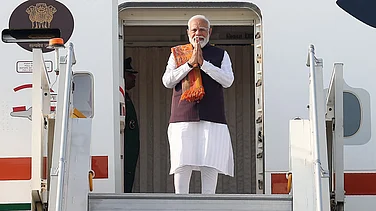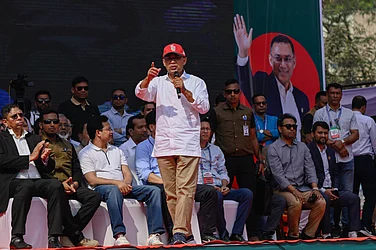Israeli Defence Minister Yoav Gallant on Thursday said that Iranian nuclear enrichment could ignite the entire region.
Gallant also said that Iran could have enough enriched uranium for five nuclear bombs. His comments amid rising international concerns over Iranian nuclear weapons program. In March, the senior-most US military general said Iran could produce a nuclear bomb within months of deciding to do so.
Iran is the principal adversary of Israel and sponsors activities against the countries, including supporting Palestinian terrorist organisations like Hamas. Israeli officials and leaders have oftern termed the potential Iranian nuclear bomb as an existential threat to their country.
International concerns over Iranian nuclear weapons program have mounted over the past months over Tehran enriching uranium closer than ever to weapons-grade levels. Experts have said that the Islamic Republic has enough fuel to build "several" atomic bombs if it chooses.
What did Yoav Gallant say?
Speaking in Greence, Israeli Defence Minister Yoav Gallant said that the Iranina nuclear bomb could ignite the region.
Gallant also said that developing a nuclear weapon would a "grave mistake" by Iran.
He said, Make no mistake, Iran will not be satisfied by a single nuclear bomb...So far, Iran has gained material enriched to 20 per cent and 60 per cent for five nuclear weapons. Iranian progress, enrichment to 90 per cent, would be a grave mistake on Iran's part and could ignite the region."
Uranium enriched for use in nuclear power plants is normally below 20 per cent, while 90 per cent enrichment is considered to be weapons grade.
Israel's leadership argues that Iran can only be stopped from developing nuclear weapons by the threat of military action, while the United States publicly favors a return to multilateral diplomatic efforts.
The International Atomic Energy Agency said in March it would restart inspections and camera-monitoring at some Iranian nuclear facilities after it reported that particles of highly enriched uranium were found at an underground nuclear site.
Iranian nuclear bomb existential threat: Israeli envoy to US
The Iranian nuclear bomb is "a threat of existential dimension" to Israel, according to Israeli Ambassador to Israel Michael Herzog.
In an interview in February, Herzog said that the Israeli position to prevent Iran from acquiring the nuclear weapon stands.
"So, Israel's position and Prime Minister Netanyahu’s position on this issue has not shifted, has not changed. There is a broad consensus in Israel. Mr. Netanyahu and previous prime ministers made it clear that Israel is determined to prevent Iran from acquiring nuclear capabilities or nuclear weapons," said Herzog in the interview to Voice of America (VOA).
He further said, "And by the way, the Iranians respected that, and did not cross that line until 2021. I think it should be understood by everybody that for Israel, this is a threat of existential dimension, a strategic threat. Israel is determined to prevent Iran from acquiring the capability to become a nuclear-armed state."
Iran could make nuke in months if it decides to: Top US general
General Mark Milley, the top US general, said in March that Iran could develop a nuclear weapon in months if it wants to.
Milley also said that the US military has options to be presented to the US leadership in case Iran acquires the bomb.
"From the time of a national decision, Iran could produce enough fissile material for a nuclear weapon in approximately 10-15 days and it would only take several months to produce an actual nuclear weapon. The United States remains committed, as a matter of policy, that Iran will not have a fielded nuclear weapon. The United States military has developed multiple options for our national leadership to consider, if or when Iran decides to develop a nuclear weapon," said Milley, the Chairman of the Joint Chiefs of Staff.
(With AP inputs)


























